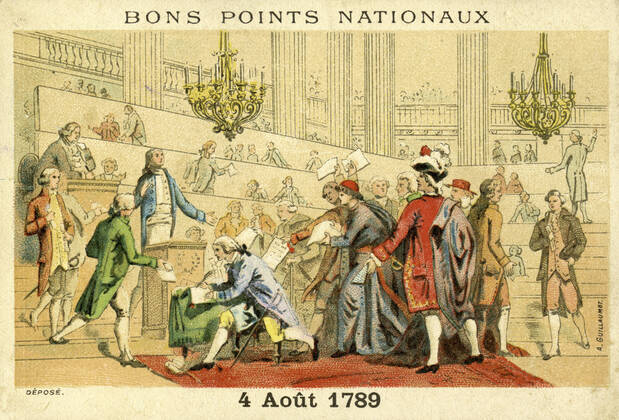Abolition of Feudalism, August 4, 1789
One of the most important outcomes of the French Revolution was the abolition of feudalism, as well as the old regulations, taxes, and privileges that remained from the feudal era.
The ferocity of peasant rebellion throughout the country alarmed National Assembly deputies at the time; to some, it appeared as if the countryside was being devoured by the chaos that threatened all property. However, the bulk of the people were unwilling to support the insurgent peasants. Rather than condemning the violence, they attempted to pacify peasant sentiment. On August 4, liberal nobility and clergy renounced their historic feudal privileges, kicking off the session. Within hours, the Assembly had decreed "the eradication of feudalism," as well as "the repeal of the church tithe," "venality of office," "regional privilege," and "fiscal privilege." To be sure, the Assembly revised the August 4 decree a few days later to ensure that "valid" seigneurial property rights were preserved. While personal feudal servitude like hunting privileges, seigneurial justice, and labor obligations were abolished outright, most seigneurial dues were only to be removed if peasants paid compensation to their lords, which was set at 20 to 25 times the annual worth of the duty. Until 1792–93, when demand grew for the complete repeal of all seigneurial dues without compensation, the vast majority of peasants opposed that need through passive resistance.
The elimination of feudalism was critical to the establishment of a modern, contractual concept of property and an unrestricted land market. However, it had no direct impact on land ownership or the level of regular rentals and leases. Although seigneurs lost some of their traditional sources of income, they remained landowners and landlords. While all peasants acquired dignity and position, only landowning peasants saw significant economic gains. Tenant farmers discovered that the tithe they had previously paid had been added to their rent. And the Assembly did almost nothing to ensure that renters and sharecroppers had improved lease conditions, let alone ownership of the land they worked.
Dates: August 4, 1789














